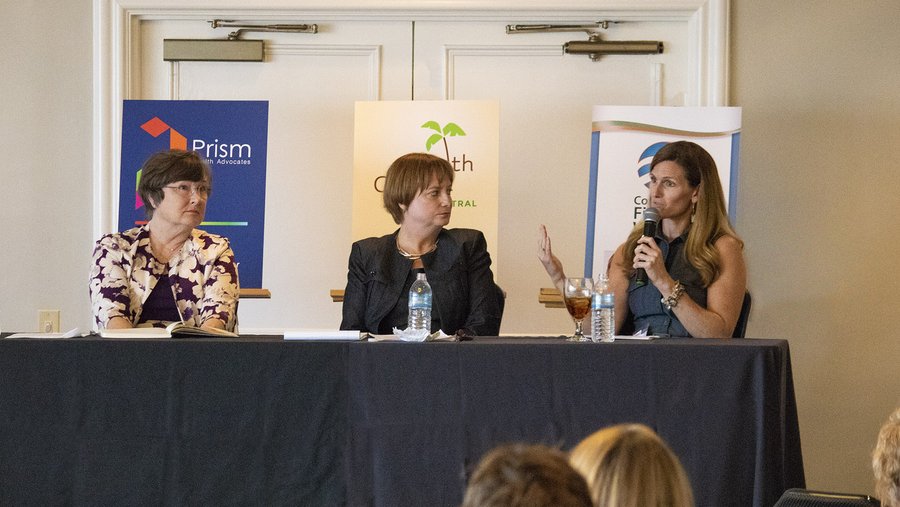If you run a company that offers health care benefits to workers, you run a health care business, says Rebecca Johnson, director of wellness services for Corporate Fitness Works.
Johnson was one of three local health experts who talked about how employers can make a difference in their workers’ health, during a panel discussion on cutting business and personal health care costs.
The panelists emphasized advocacy, transparency and education at the Aug. 22 event, sponsored by the Women’s Business Development Council of Florida and Prism Health Advocates.
Access to quality care should be available to everyone, said Debbie Bain, founder and managing director of Prism and a former trauma nurse. But she and the other panelists said there are systemic issues that need to be addressed before that happens.
“We have a sick care system, not a health care system,” said Teresa Kelly, executive director of the Health Council of West Central Florida, a nonprofit that addresses health care needs of residents in Hillsborough, Manatee, Highlands, Hardee and Polk counties.
Kelly urged employers to educate their workers about health care insurance.
“There are a lot of employees who don’t understand the difference between a co-pay, a deductible, co-insurance, any of those things. If you are offering insurance to your employees, please make sure they have some idea of what those terms mean. A lot of times, they don’t,” she said. “And make sure they understand how much their insurance actually costs, not what it costs them but it what it costs. Because we have to start raising some awareness around the fact that just because you get your insurance through your employer — and a worker might think they are only paying $100 a month — no, the employer is paying $800.”
Johnson said wiser health care consumers can make a difference.
“The system is skewed toward over-diagnosis, over-treatment, and very sneaky pricing. The only way to combat that is to be as knowledgeable as you can and know how to ask questions. If a doctor recommends you have a CAT scan, you can ask questions like, ‘Do you have the results of my previous tests? What are the risks of a CAT scan compared to the benefits? Will this CAT scan affect the course of my treatment?’” Johnson said. “You’re going to be the best advocate for yourself in the health care system. Ask questions.”
There are tools available to employers to help their workers become wiser consumers. Corporate Fitness Works, a St. Petersburg-based company that provides wellness and fitness programming for companies nationwide, uses Quizzify and encourages its own clients to use it as well.
“You take a 10-question quiz, one a month. It’s like Jeopardy meets Comedy Central, and somehow they have a way of turning a dry and boring subject into something that’s entertaining. If you are an employer looking for tools to help your employees become wiser consumers you have to offer that in an engaging way,” Johnson said.
Transparency also is key, Bain said. She cited the case of a patient who received a $44,000 medical bill with no detailed breakdown of individual line items. Once the patient received that breakdown, he realized he had already paid for four of the charges included in the overall bill.
“Demand transparency. You have that right,” Bain said. “Having run a trauma center, I will tell you that it does matter. The majority of people who work in health care are there for a reason, they actually care. The hospitals are held accountable, but you have to know you can push back.”
Employees’ lives and the health care system are constantly changing, so corporations should seek help in designing their health plans, Bain said.
“Have a company that will help you work with your employees, talk to them, get feedback from them. Each individual company can work with someone who knows what they are doing and drive those costs down, bit by bit, while you figure out the demographics of your company and what works for you,” Bain said.
Employers who don’t provide health care coverage should encourage their workers to look to programs available under the Affordable Care Act, Kelly said. Florida has the largest percentage of participants in the exchanges established by the ACA. Roughly 12.7 percent of Florida’s population buys individual insurance on the exchanges, versus 6 percent nationwide, Kelly said.
“There’s a couple of things happening in 2019 that you really need to know,” Kelly said. “First the open enrollment period has been cut to 45 days from 90 days. It used to be 90 days. So it starts Nov. 1 and goes through Dec. 15. This is not a lot of time, and it’s a time of year when people are also distracted by holidays and other things going on.”
The Trump administration earlier this year cut funding for navigators, who help people sign up for the exchanges. But some navigators still will be available, Kelly said, and she said employers should make it easy for workers to get the resources they need.
“Give them an hour off to go meet with a navigator. Do something to encourage them to participate in the process,” she said.
